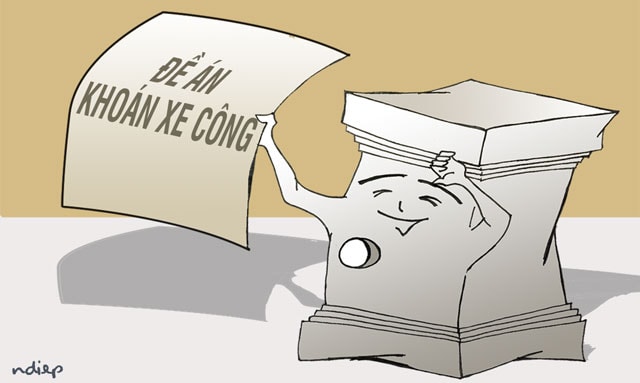Why can't the Deputy Minister travel like the people?
Early last week, the image of 6 Deputy Ministers of the Ministry of Finance taking a taxi or private car to work for the first time caught the attention of many people. Many opinions were discussed and debated. Some praised, others expressed doubts about the effectiveness of this "pilot". But in fact, it is undeniable that this helps reduce budget costs.
 |
| (Illustration: Ngoc Diep) |
We must see that, with the current policy of blue-plate cars serving "bosses", that blue-plate car does not only serve one "boss" but the driver is often required to: Take the boss's wife to work, go out, take the boss's children to school, take the boss's whole family out to eat, go back to the countryside, travel, take the boss to play golf... Therefore, the driver's salary is one thing, the gas money the State has to spend is extremely large.
In reality, there are too many cars serving the current leadership positions. If the above policy is applied, even if it is just a fixed fee for car use to pick up and drop off from home to the office, not allowing car use, only allowing car use for official business, it will certainly save at least several billion VND/year.
Remember, although public cars are currently only regulated to serve individuals from the level of Deputy Minister, General Director and above, and locally, only in Hanoi and Ho Chi Minh City, leaders at the level of Vice President, President, Secretary are allowed to use private cars, and the whole country only has about 900 cars regulated to serve the "big bosses" privately. But in reality, in most places, district and county leaders have been leisurely using blue-plate cars for public and private work 365/365 days a year.
According to the figures announced by the Department of Public Asset Management, the whole country currently has nearly 40 thousand public vehicles and the average cost for one public vehicle is about 320 million VND/year: Fuel, maintenance, driver's salary... And people often mistakenly think that the same amount is spent on vehicles serving Deputy Ministers, Ministers, Chairmen, and Secretaries of provinces. In reality, the cost for vehicles serving individuals and shared vehicles in ministries and branches is much larger, some vehicles can even reach 7-800 million VND/year because among those nearly 40 thousand public vehicles, there are specialized vehicles that are rarely used, so the cost for those vehicles is very low.
Therefore, by requiring its Deputy Ministers and General Directors to take their own vehicles to and from the ministry, the Ministry of Finance has done something that is worth our encouragement, instead of being skeptical and criticizing forever. This can be considered an initial effort to set an example, reducing the use of public vehicles for private purposes.
A department-level official of the Ministry of Finance said that, in fact, many Deputy Ministers "do not like this car allocation" because, after all, using a public car to pick up and drop off is still more convenient than taking a taxi, and the cost of a few million VND is not much of a problem for them. He said that in the past few days, dozens of Deputy Ministers of other ministries and branches have called to express their concern: "Oh, so you guys are really applying this?" With a real concern that if the budget allocation for using public cars will be applied to other ministries in the future.
Many people who are currently using the shuttle policy are talking about the application of this policy. Someone said: If you use a private car with a white license plate, you will not be able to enter state agencies: the Government Office, the National Assembly... because security will not let you in. But fortunately, there are also Deputy Ministers who are aware of the problem. A Deputy Minister of Finance said: I think it's OK, no problem. If a taxi picks you up at the National Assembly headquarters, and you can't get in, then you can walk a short distance, what's the problem? Why can't Deputy Ministers travel like ordinary people? That's a correct and positive thought.
By now it is clear that if this allocation of public vehicle expenses is applied effectively and saves a lot, then the following experience in organizing and applying it widely in many ministries, branches and localities can reduce thousands, even tens of thousands of billions of VND each year. Especially if the allocation is also for business trips.
Of course, there may be some people who are expected to be contracted and not use public cars who are not happy with this policy (previously, in the National Assembly, there were people who volunteered to receive a contract of 10 million VND/month but then asked to give up because they felt that using public cars was more enjoyable and more prestigious). But that is why it is necessary to apply the contract for public cars.
According to Dan Tri








